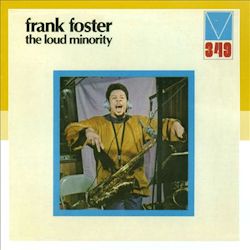1. The Loud Minority
2. Requiem For Dusty
3. J.P.ís Thing
4. E.W. - Beautiful People
Frank Foster - Tenor sax, alto sax, soprano sax, clarinet (alto)
Kenny Rogers - Alto sax, baritone sax, bass clarinet
Cecil Bridgewater, Charles McGee - Trumpet, flugelhorn
Marvin Peterson - Trumpet
Dick Griffin - Trombone
Earl Dunbar - Guitar
Gene Perla, Stan Clarke - Acoustic and Fender bass
Harold Mabern, Jan Hammer - Piano, electric piano
Omar Clay, Richard Pratt - Drums
Elvin Jones - Drums, percussion
Airto Moreira - Percussion
Dee Dee Bridgewater - Vocals
The 1970s were a tubulent decade across many countries and fronts that included political and racial conflicts, and no less so in music. Although disco as
a theme ran through the general music environment, jazz was also undergoing an upheaval with jazz fusion and funk pushing the musicís purists to the
sidelines. It was in that fusion-funk context that Frank Foster brought together a band of both conventional and progressive jazz musicians to give shape
to this musical form with The Loud Minority.
Frank Fosterís antecedents were with the Count Basie band for a 10-year period starting in 1953. Not only was he a mainstay of the saxophone section, he
also arranged and contributed a number of tunes that became an integral part of the Basie book, such as Shiny Stockings and Down For The Count. For another decade starting in the mid 1980s Foster led the Basie band after the Countís death. In 1972 when The Loud Minority was released, Foster along with many other musicians of his ilk, was trying to find a format to remain relevant in a period when
the black American musical experience was somewhat radicalized. The title track starts with horn movement but then drifts into a speech by Dee Dee
Bridgewater that lays down certain claims: ĎThe Loud Minority is not a non-profit organizationÖbut is part of those concerned with freedom.í At this point
the band, driven by the electrified combination of instruments, segues into a free form interplay that expands the boundaries of the band.
Requiem For Dusty
starts as a ballad in a melancholy vein with an opening chorus by the band, then Stanley Clarke moves in with an arco acoustic bass solo perfectly suited
to the theme. Further along Foster takes a turn on alto sax which he generally eschews. The band then rolls into a funky groove which advances the track
towards a conclusion. J.P.ís Thing is another extended piece that has an interesting harmonic invention layered by the horns
working together. Jan Hammerís electric piano takes several choruses to broaden the melody, then Dick Griffinís trombone howls and growls through an
interlude that leads to the band then picking up the theme that flows to an unexpected conclusion following some spirited drum work from Elvin Jones.
Lastly E.W. - Beautiful People begins with Dee Dee Bridgewater layering in vocally ĎEd Williams beautiful peopleí several times over as the band
shapes the melody in a Latin fashion with Fosterís soprano sax riding over the band which is then followed by Harold Mabernís piano in a brief solo
excursion. Trumpeter Charles McGee shows his facility with arpeggios and triplets as he dazzles in the upper register.
At just four tracks and forty-two minutes of music, this reissue is for those funk aficionados who may feel they missed something the first time around.
Pierre Giroux
